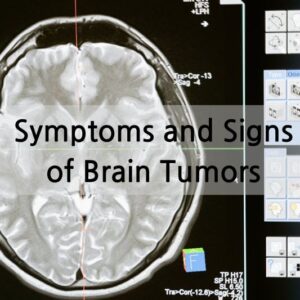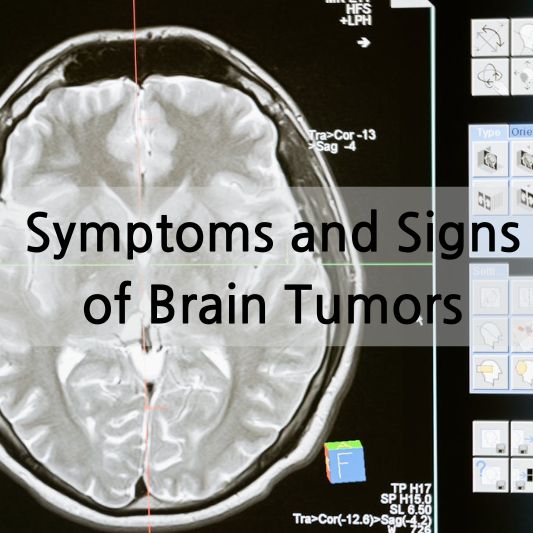Brain tumors can be a frightening diagnosis, but understanding the symptoms can lead to earlier detection and better outcomes. Here’s what you need to know about the signs and symptoms of brain tumors.

Signs of Brain Tumors
Headaches
Headaches are one of the most common symptoms of a brain tumor. These headaches are often severe, persistent, and may worsen over time. They can be accompanied by nausea and vomiting, especially in the morning.
Seizures
Seizures are another common symptom, particularly if they occur suddenly in someone who has never had them before. These seizures may involve convulsions or loss of consciousness.
Cognitive Changes
Brain tumors can affect cognitive function, leading to memory problems, confusion, difficulty concentrating, and changes in personality or behavior.
Speech Difficulties
Tumors in certain areas of the brain can impact speech production and comprehension, leading to slurred speech or difficulty finding the right words.
Vision Problems
Tumors near the optic nerve can cause vision problems, including blurred vision, double vision, or even loss of vision in one or both eyes.
Balance Issues
Tumors in the cerebellum, which controls coordination and balance, can cause problems with walking, coordination, and balance.
Symptoms Depending on Tumor Location
The symptoms of a brain tumor can vary depending on its location within the brain.
Frontal Lobe Tumors
Tumors in the frontal lobe can cause changes in personality, difficulty with problem-solving and planning, and weakness or paralysis on one side of the body.
Temporal Lobe Tumors
Tumors in the temporal lobe can cause seizures, memory loss, and changes in mood and behavior.
Parietal Lobe Tumors
Tumors in the parietal lobe can cause sensory disturbances, such as tingling or numbness in the limbs, as well as difficulty with spatial awareness.
Occipital Lobe Tumors
Tumors in the occipital lobe can cause visual disturbances, including hallucinations, blind spots, and difficulty recognizing objects or faces.
Symptoms in Children
Brain tumors in children can present differently than in adults.
Behavioral Changes
Children may experience changes in behavior, such as irritability, mood swings, or withdrawal from activities they once enjoyed.
Delayed Development
Brain tumors can interfere with a child’s development, causing delays in reaching milestones such as walking, talking, or potty training.
Difficulty Walking
Tumors affecting the cerebellum can cause problems with coordination and balance, leading to difficulty walking or frequent falls.
Diagnosing Brain Tumors
Diagnosing a brain tumor typically involves a combination of medical history, physical examination, and imaging tests.
Medical History and Physical Examination
Doctors will ask about symptoms, medical history, and perform a neurological examination to assess brain function.
Imaging Tests
Imaging tests such as MRI or CT scans can help visualize the tumor and its location within the brain.
Biopsy
A biopsy may be necessary to confirm the diagnosis and determine the type of tumor.
Treatment Options
Treatment for brain tumors depends on several factors, including the type, size, and location of the tumor, as well as the patient’s overall health.
Surgery
Surgery may be performed to remove as much of the tumor as possible.
Radiation Therapy
Radiation therapy uses high-energy rays to kill cancer cells and shrink tumors.
Chemotherapy
Chemotherapy involves the use of drugs to kill cancer cells or stop them from growing.
Targeted Drug Therapy
Targeted drug therapy uses drugs that specifically target certain molecules involved in cancer growth.
Prognosis and Survival Rates
The prognosis for a brain tumor depends on various factors, including the type and grade of the tumor, its location, and the patient’s age and overall health.
Coping with Brain Tumor Symptoms
Coping with the symptoms of a brain tumor can be challenging, but there are resources and support available to help patients and their families.
Prevention and Risk Factors
While the exact cause of most brain tumors is unknown, certain factors may increase the risk of developing one.
When to See a Doctor
It’s essential to seek medical attention if you experience any symptoms that could indicate a brain tumor, especially if they are persistent or severe.
Research and Advances in Brain Tumor Treatment
Ongoing research is continuously improving our understanding of brain tumors and leading to new treatment options and approaches.
Importance of Early Detection
Early detection of brain tumors can lead to more effective treatment and better outcomes.
Conclusion
Being aware of the symptoms of brain tumors is crucial for early detection and prompt treatment. If you or a loved one experience any concerning symptoms, don’t hesitate to seek medical attention.
FAQs
1. Can headaches alone be a sign of a brain tumor?
Headaches can be a symptom of a brain tumor, especially if they are severe, persistent, or accompanied by other neurological symptoms.
2. Are all brain tumors cancerous?
No, not all brain tumors are cancerous. Some are benign, meaning they are non-cancerous and grow slowly.
3. Is it possible to prevent brain tumors?
While the exact cause of most brain tumors is unknown, there are currently no known ways to prevent them entirely.
4. How are brain tumors treated?
Treatment for brain tumors typically involves a combination of surgery, radiation therapy, chemotherapy, and targeted drug therapy, depending on the type and location of the tumor.
5. What is the survival rate for brain tumors?
Survival rates for brain tumors vary depending on several factors, including the type and grade of the tumor, its location, and the patient’s overall health.
